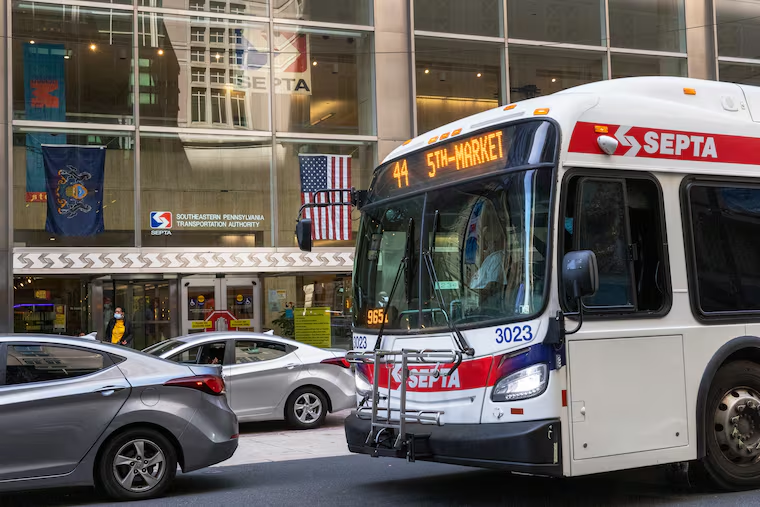Two ex-SEPTA managers sent to prison for fraud scheme that cost the agency nearly $1M
In all, seven of the transit agency's former managers have pleaded guilty to participating in the bribery scheme that cost SEPTA more than $900,000 over six years.

Two former senior SEPTA maintenance managers were sentenced to prison Tuesday for leading a scheme in which they and nine of their subordinates bilked the transit agency out of hundreds of thousands of dollars over six years.
A federal judge ordered David Abell — the agency’s former senior director for maintenance — to spend five years behind bars for originating the scheme, which involved colluding with vendors to charge for goods that were never provided and pocketing the proceeds.
He and the other former SEPTA employees have admitted to receiving cash bribes and personal goods including hunting supplies, ATV equipment, rare gold coins, and even a whippet puppy in exchange.
When Abell retired in 2015, his replacement, Rodney Martinez, kept the bribery scheme going. He received a sentence of two years and six months Tuesday during a hearing before U.S. District Judge C. Darnell Jones II.
» READ MORE: Ex-SEPTA managers took cash, rare coins, and even a puppy in a fraud scheme that cost the agency nearly $1M, feds say
“Philadelphians deserve public employees who do their jobs honestly, without gaming the system to line their own pockets,” said U.S. Attorney Jacqueline C. Romero. “At a time when SEPTA is facing significant challenges to continue serving and protecting its riders, the defendants’ actions — and those of their coconspirators — are the definition of selfish greed.”
In all, Abell and Martinez’s fraud scheme cost SEPTA more than $900,000 between 2013 and 2019, when the agency’s financial safeguards flagged suspicious procurement spending in its Bridges and Buildings Department, prompting an internal probe that was shared with the FBI.
“We still feel the impact — financial loss, decreased morale, and damaged reputation,” SEPTA Inspector General Denise S. Wolf and Robin Deveney, the agency’s director of procurement, wrote in a victim impact letter to the court. “The effects of this fraud are not going away any time soon.”
Turner told a federal judge last year that among the gifts he received was a whippet puppy.
The scheme began in 2013 when Abell first approached two trusted vendors — Mark Irvello, owner of MSI Tool & Repair Supply in Upper Darby, and Stanley Woloff, who owns Advantage Industrial Supply in Philadelphia — with a proposal he felt could benefit them all.
If they would provide him with bribes of $1,000 to $2,000 a month plus occasional other gifts, Abell would steer legitimate SEPTA business their way and allow them to charge the expense of paying him off plus kickbacks for themselves to the transit agency on credit cards SEPTA issued to managers for emergency expenses.
The arrangement proved lucrative. Abell took home more than $100,000 in bribes before he retired, Assistant U.S. Attorney Louis D. Lappen said in court filings in advance of Tuesday’s hearing. And afterward, Irvello and Woloff continued to deliver payoffs to Martinez for years, which they charged back to SEPTA disguised as the cost of legitimate goods.
Between 2015 and 2019 they expanded the breadth of their graft by adding the nine other managers to their list of paid-off employees — including four whom prosecutors have not named or charged.
» READ MORE: Who is SEPTA Chief Thomas Nestel and why is he retiring?
The remaining five — Jesse Fleck, Peter Brauner, John Brady, James Turner, and Stephen Kish — were all charged alongside Abell and Martinez last year and, like them, have admitted they also received payoffs as well as personal goods ranging from mundane items like TVs, a refrigerator, and an Xbox to the more unusual.
Turner told a federal judge last year that among the gifts he received was a whippet puppy. Kish has admitted to accepting $215,000 worth of gold bullion and rare gold coins, which he later resold.
All the men have either retired, resigned, or left SEPTA and have lost their pensions because of their crimes. Fleck, Brauner, Brady, and Turner were sentenced to terms of probation at hearings earlier this year and were ordered to pay restitution to the transit agency.
Irvello, one of the vendors, was sentenced to 2½ years in prison in May. Woloff, the other vendor, is scheduled to be sentenced in September along with Kish.
For their parts, Abell, now 72 and living in Chincoteague, Va., and Martinez, 50, of Blackwood, N.J., both sought to avoid prison time in their sentencing hearings Tuesday.
Abell’s lawyer, Evan T.L. Hughes, cited his client’s advanced age and ailing health as a reason to keep him out of prison.
» READ MORE: Reports of aggravated assault and robbery on SEPTA soared during the pandemic as ridership fell
Martinez’s attorney, Saul J. Steinberg, described his client as deeply remorseful but noted he was struggling financially to care for his ailing wife, who has been diagnosed with multiple sclerosis, when he became involved in scheme.
“How do years and years of health and financial stresses and crises affect one’s resolve?” Steinberg asked in a brief filed with the court in advance of Tuesday’s hearing. “Having lost their home in 2007, what was the effect on Rodney’s otherwise good sense and judgment?”
But Lappen balked in court papers at any suggestion that Martinez’s rocky home life somehow excused his crimes.
“There was no excuse for this criminal behavior,” Lappen said. “He was a well-paid SEPTA manager and supervisor who should have known better.”
In addition to their prison terms, Jones, the judge, ordered Abell and Martinez to serve three years’ probation upon their release and pay restitution and forfeiture totals of $309,300 and $436,300, respectively.